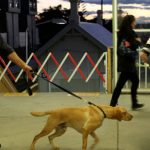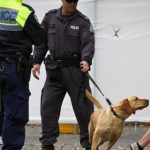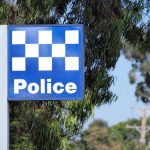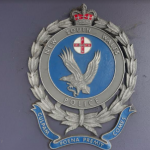NSW Police Force Doubles Strip Searches
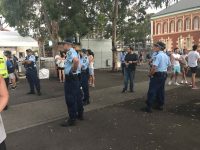
The NSW Police Force has nearly doubled the number of strip searches it carries out after positive indications from drug detection dogs.
In 2016, police officers carried out around 590 strip searches after an initial search turned up nothing, while in 2017 the number skyrocketed to 1,124.
Of all the strip searches that were carried out last year, illicit substances weren’t found 64 percent of the time. This means 718 people were ordered to take off their clothes and squat in front of police for no reason.
Last week, the answers to questions on notice at a recent NSW Budget Estimates hearing were published. Within the document, NSW police commissioner Mick Fuller admitted there was no policy change that led to the increase in strip searches.
The top cop also agreed that the strip searches resulted in no drugs being found two-thirds of the time.
The man who asked the questions of Mr Fuller was NSW Greens MLC David Shoebridge. He also obtained the figures via the provisions of the Government Information (Public Access) Act 2009 that showed the seemingly inexplicable rise in strip searches.
A failed drug war tactic
“The rising number of strip searches erodes trust in police,” Mr Shoebridge told Sydney Criminal Lawyers®. “Hundreds of people are being left humiliated and violated after coming into contact with NSW police.”
The NSW Greens justice spokesperson has been a vocal critic of sniffer dogs and the accompanying use of strip searches since he launched anti-drug dog campaign Sniff Off back in 2011. It’s a joint venture with the NSW Young Greens.
The sniffer dog statistics that he’s gathered over that time show that drug detection dogs make indications that result in no illicit substances being found between two-thirds and three-quarters of the time.
“The police could be playing a much more positive role in community safety,” Mr Shoebridge continued. “Instead they’re harassing young people, Aboriginal people and poorer communities with police drug dogs and strip searches.”
A show of might
According to Shoebridge, the reason NSW police continue to pursue this hopelessly flawed search method is PR. It’s all about “the police being seen to do something on the failing war on drugs.”
And an exchange between Mr Shoebridge and the police commissioner seems to demonstrate this point. During the Budget Estimates hearing, Shoebridge suggested that if police were concerned about young people overdosing at festivals, they should provide amnesty bins.
This harm reduction method would allow festivalgoers to drop any drugs they had on them into a bin without the threat of being arrested. This would prevent panic overdosing, which has occurred when patrons take all their drugs at once on seeing a drug detection dog operation.
At least two young Australians have died at festivals after swallowing a lethal amount of drugs on spotting sniffer dogs. James Munro tragically died at Sydney’s Defqon.1 festival in 2013 after panic overdosing.
However, Mr Fuller said the amnesty bins would just send “a bad message.” The police commissioner further stated that “government taking a soft approach only green-lights people for the use of drugs.”
So, it seems that being seen to be tough on drugs is more important to NSW police than applying evidence-based methods that save people’s lives. And the continued use of drug dogs is a case in point. The dogs give off a menacing image, as they walk about randomly indicating anyone.
An invasive technique
And in keeping with that tough on drugs stance, it might be thought that an unofficial policy of getting young people to strip off and observing them – after having threatened them with a dog -further asserts that NSW police are indeed partaking in the drug war.
The police powers to stop and search a person without a warrant are contained in the Law Enforcement (Powers and Responsibilities) Act 2002. Section 31 of the Act sets out how officers must conduct a strip search.
If an officer “suspects on reasonable grounds” that the “seriousness and urgency of circumstances” make a strip search necessary, then they can carry one out in a place like a music festival. Obviously, an indication from a dog that gets it wrong most of the time is an urgent matter.
A strip search has to be carried out in a private enclosed area, like a tent. It must be conducted by a member of the same sex. And at no time should body cavities – including the mouth – be searched, and neither should officers touch the individual in anyway.
No one should be present that doesn’t need to be at the strip search, and nor should any item of clothing be unnecessarily removed. And under no circumstances are strip searches to be carried out on children under the age of 10.
The war on festivals
Meanwhile, NSW police are continuing their ongoing assault on festivalgoers, as the state government continues to refuse to allow pill testing services that would save lives. On Saturday, there was a heavy police presence, which included drug dogs, at the Listen Out Festival in Centennial Park.
This was just a fortnight after 180 officers were deployed at the Defqon.1 festival in southwestern Sydney. Tragically, at that event, two people in their early 20s died after suspected drug overdoses.
NSW police really stepped up this crackdown in mid-2018 when it launched another unofficial policy, where punters at Midnight Mafia and Above and Beyond festivals were prevented from entering the events if a sniffer dog made a positive indication, even if no drugs were found.
And the statistics would indicate that officers made a large number non-drug carrying individuals at all of these events take off all their clothes after a dog sat down beside them.
Strip searching with prejudice
And as Mr Shoebridge has pointed out, this recent rise in strip searches is impacting citizens from lower socioeconomic backgrounds the most.
At the hearing, he inquired as to why the police weren’t carrying out strip searches in Malcolm Turnbull’s former electorate of Wentworth, where wastewater analysis has shown “the highest level of drug use pretty much anywhere in the country.”
Mr Fuller put this down to no dance parties taking place in that area. But, this is hardly the case. Statistics show that sniffer dog operations are less likely to be carried out in wealthier parts of Sydney.
“Police drug dog searches are carried out more aggressively in poorer communities and areas with a high Aboriginal population,” Shoebridge made clear. “They’re also used to target young people at music festivals.”
The 2013 sniffer dog statistics revealed that a passenger getting off a train at Redfern Station was six and a half times more likely to be searched than an individual who gets off at Central Station: the next stop down the tracks. Redfern has a large population of Aboriginal people and young people.
“We have conducted a review of the data and it shows the largest single predictor of drug dog operations is the proportion of First Nations people in the area aged 18 to 35,” Mr Shoebridge concluded.


